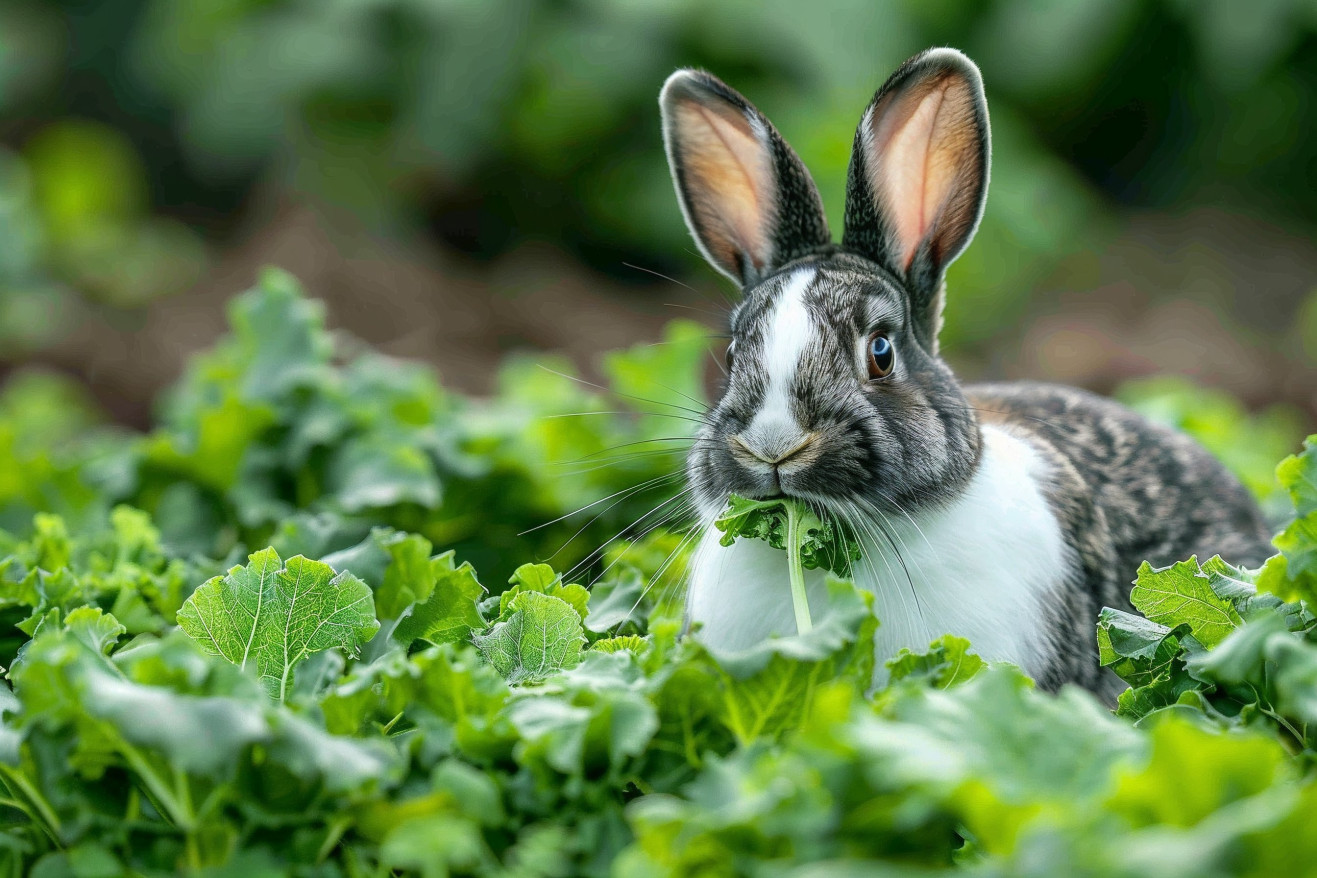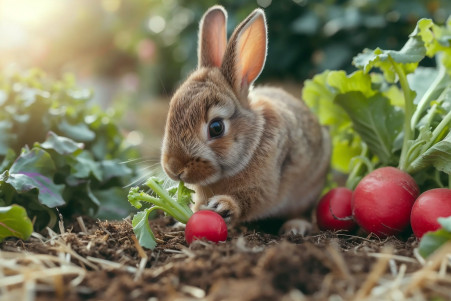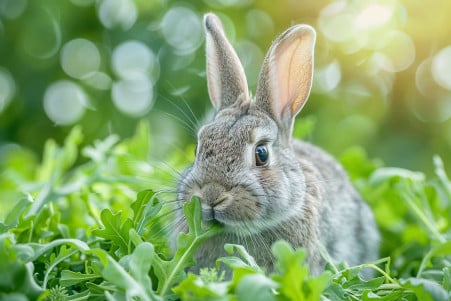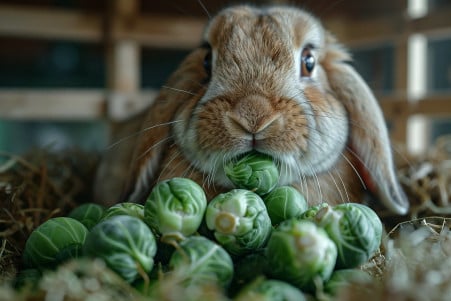Do Rabbits Eat Turnip Greens? What You Need to Know
16 May 2024 • Updated 16 May 2024

Rabbits are herbivores, and as such, they eat a lot of leafy greens, but can they eat turnip greens? Rabbits can eat turnip greens as a small part of a balanced diet. Turnip greens are a good source of vitamins A, C, and K, as well as calcium and fiber, all of which are good for rabbits.
Below, we'll explore the findings of veterinarians to help you understand the right serving sizes and things to keep in mind when feeding turnip greens to your rabbit. This information will help you make sure that you're feeding your rabbit turnip greens in a way that's best for their health and happiness.
Can rabbits eat turnip greens?
How Much Turnip Greens Can Rabbits Eat?
Like with any food, portion size matters when it comes to feeding turnip greens to rabbits. In general, rabbits can eat about 1 cup of leafy greens for every 2 pounds of body weight per day. For non-leafy vegetables, like the turnip itself, the recommended amount is about 1 tablespoon for every 2 pounds of body weight. That said, it's important to introduce new foods slowly to avoid upsetting your rabbit's digestive system.
When you first give your rabbit turnip greens, offer them a small piece, about the size of your thumb, and see how they react. Then, over the course of a few weeks, gradually increase the amount as long as their poop stays normal. Remember that hay and pellets should still make up most of your rabbit's diet, with greens, including turnip greens, serving as a supplement.
It's important to note that you should watch your rabbit's reaction to turnip greens closely, as some rabbits have more sensitive stomachs than others. If you notice any changes in your rabbit's poop or eating habits after introducing turnip greens, cut back on the amount or take them out of their diet for a little while. It's also important to make sure your rabbit is getting a variety of foods, so try to rotate turnip greens with other leafy greens and vegetables to make sure they're getting a good mix of nutrients.
Nutritional Benefits and Risks of Turnip Greens for Rabbits
Turnip greens are full of vitamins and minerals that can be very beneficial for rabbits. Per rabbits.life, turnip greens have a high calcium content, with 105 mg per 1 cup serving, which can be very helpful for bone and dental health. They also have high levels of vitamins A, C, and K.
It's important to make sure that rabbits are eating a wide variety of greens to ensure that they're getting a well-rounded diet. The Indiana House Rabbit Society suggests that rabbits should have a "salad a day" with at least three different types of greens to ensure that they're getting the nutrients that they need.
That said, because of their high calcium content, turnip greens should be fed in moderation. Rabbits Online warns that too much calcium can lead to problems like bladder sludge or kidney stones. In addition, rabbits can have trouble digesting cruciferous vegetables like turnip greens, which can lead to gas and discomfort.
To make sure that you don't cause any digestive issues, it's important to introduce turnip greens slowly and watch your rabbit for any signs of a reaction. If you notice changes in your rabbit's stool or appetite, you may want to cut back on the amount of turnip greens they're eating or take them out of their diet for a short period of time. It's also important to wash all produce thoroughly to remove any pesticides before giving it to your rabbit.
How to Prepare and Feed Turnip Greens to Your Rabbit
When preparing turnip greens for your rabbit, make sure to wash them thoroughly to remove any dirt, pesticides, or other harmful substances. Per rabbits.life, it's best to leave the greens whole instead of chopping them up, as rabbits prefer to eat them this way. However, if you're feeding your rabbit other vegetables, like celery, you should cut them up to avoid choking hazards.
To ensure that your rabbit is getting a well-rounded diet, you can mix turnip greens with other leafy greens and vegetables. The Homesteading Today forum recommends combining turnip greens with beet tops. Just remember that cruciferous vegetables like turnips can cause gas or other digestive issues in rabbits, so you should always introduce new foods to your rabbit slowly and watch for any adverse reactions.
One fun way to feed turnip greens to your rabbit is to hide them in their hay for a foraging experience. You can also incorporate them into homemade rabbit treats or toys. The most important thing is to make sure that your rabbit is having fun and staying engaged during mealtime.
How to Add Turnip Greens to Your Rabbit's Diet
As with any animal, rabbits need a balanced diet to stay healthy. The RSPCA recommends giving rabbits an "adult-sized handful of safe, washed leafy green vegetables, herbs and weeds daily" and feeding them 5-6 different types of greens to make sure they get all the nutrients they need.
To make sure your rabbit gets the nutrients they need, you can alternate turnip greens with other leafy greens and vegetables. BinkyBunny suggests giving your rabbit 4-6 oz of vegetables a day, which could include a romaine leaf and some parsley or another green, three times a day. The Pet Care Advisors Facebook page says you can add turnip greens to your rabbit's daily salad.
It's important to remember to introduce new foods like turnip greens slowly to avoid upsetting your rabbit's digestive system. Rabbits can have a hard time with sudden changes in their diet, so it's best to introduce new foods slowly and keep an eye on how your rabbit reacts to them. By making sure your rabbit gets a variety of foods, introducing new foods in moderation, and watching how your rabbit reacts to new foods, you can make sure that your rabbit gets the nutrients they need from turnip greens while keeping them safe.
Conclusion: How to Feed Rabbits Turnip Greens for the Best Health Outcomes
While turnip greens can be a nutritious food for rabbits, it's important to introduce and feed them in a responsible way. This means starting with small amounts, approximately the size of your thumb, and gradually increasing the amount you feed your rabbit over a period of weeks to allow their digestive system to get used to the new food. It's also important to feed turnip greens in moderation because they are high in calcium, which can lead to health problems if rabbits eat too much.
In addition, it's important to ensure that rabbits have a varied diet. This means that turnip greens should be fed in rotation with other leafy greens and vegetables to ensure that rabbits get a good mix of essential nutrients. The Spruce Pets recommends that a variety of greens should make up 10-15% of a rabbit's diet, with hay and pellets making up the rest.
When feeding turnip greens, make sure to wash them thoroughly to remove any dirt or other contaminants. Rabbits tend to prefer larger pieces of greens to small, chopped pieces. You can also hide turnip greens in your rabbit's hay to encourage foraging.
In the end, feeding turnip greens to your rabbit requires careful observation and a commitment to responsible feeding. Pay attention to how your rabbit responds to the new food and adjust the amount you feed them as needed to ensure that you're supporting their health and well-being. If you have specific concerns about feeding turnip greens or other new foods to your rabbit, make sure to check with your vet.


